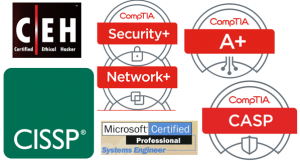 There are many different ways to go about studying for and passing a certification exam. Not every method will work for all people. Here are some techniques that I have used to prepare for, pass, and maintain my professional certifications.
There are many different ways to go about studying for and passing a certification exam. Not every method will work for all people. Here are some techniques that I have used to prepare for, pass, and maintain my professional certifications.
Why Certify? – There is no denying that experience is the best teacher, and time on the job is one of the major criteria used in making hiring decisions. But it is not the only criteria. Certification is a well-regarded method of proving your mastery of a subject area, and can enhance your promotability or employability. Certification can also be useful for individuals who are trying to start a career in information technology, or move into a new specialty such as cybersecurity, but lack direct experience. A certification can be one way to prove that your knowledge and skills are current, and you are ready to assume the responsibilities of the position.
Choose Your Cert – Typically, information technology professionals will choose a certification based on their professional interests and career goals. Certification comes with some significant costs. Find out how much you will need to invest financially. Be sure to check if you employer will pay for certification through their educational benefits.
The CompTIA A+ is a foundational, entry-level certification and a good place to start. Many people beginning IT careers will pursue the A+, Network+, and Security+ certifications at the beginning of their career. If you are interested in networking, maybe a Cisco certification would be beneficial. Working in a Microsoft shop, maybe a Microsoft cert makes sense. For cybersecurity professionals, maybe the E-C Council’s CEH, or (ISC)2’s CISSP are on your radar. But there are hundreds of certs to choose from. Proprietary certifications like Microsoft or Cisco focus on product specific skills. Non-proprietary certifications are less product focused, and the skills you learn are more widely applicable in any network or operating system environment.
Study and Prepare – As good as your experience may be, you will need to prepare for the exam. Certification exams test your knowledge in specific ways, and without preparation you will not be prepared to answers the questions on the exam. Here are the main ways I have prepared for different exams:
- Use multi-modal training – What I mean is this: use all of your senses. Most of us learn primarily through a combination of sight and hearing. Make sure your training method uses both. Audio books can be a nice addition. Taking notes and highlighting the text book, even if you never use them for review, engages your sense of touch. So does on-the-keyboard labs and exercises,. Your senses of taste and smell are up to you.
- Buy the official curriculum and supporting books – Buy the official study guide and read it. If there are topics that are not presented in a way you understand, then do some additional outside reading on the web using Google search, or purchase some books that explain the subject better. There will be lots of reading. Read the course and test objectives. I always focus on the table of contents, section headers, any text is bold, italicized, or underlined, and all pictures, charts, or illustrations, along with image captions, because this information ends up in the test.
- Training class – Enroll in a training class. This might take the form of a one-week boot camp, or something longer. Live in-person classroom training is the most expensive. Alternatives include live on-line and recorded on-line. Check out Udemy, Cybrary, and Lynda.com for online options. Also, check out the excellent free training videos from Professor Messer.
- Study group – If you can find a study group, join it. Check out MeetUp or Eventbrite, or the local chapters of your certifying organization. If all else fails, maybe you should start a study group.
- Labs – If there is a hands-on component to your training, you may need to create a practice labs for yourself using virtual machines or a virtual network emulator such as GNS3. You can also rent space on pre-configured practice labs too.
In studying for the certification, there are really two objectives. The first is to learn the material you will need to know and use in your future information technology role. You should be learning things that will be valuable for your whole career. The second objective is to learn as closely as possible the exact topics and questions you will need know to to pass your certification exam. In our next post we will discuss preparation for the actual exam.
ShareNOV




About the Author:
I am a cybersecurity and IT instructor, cybersecurity analyst, pen-tester, trainer, and speaker. I am an owner of the WyzCo Group Inc. In addition to consulting on security products and services, I also conduct security audits, compliance audits, vulnerability assessments and penetration tests. I also teach Cybersecurity Awareness Training classes. I work as an information technology and cybersecurity instructor for several training and certification organizations. I have worked in corporate, military, government, and workforce development training environments I am a frequent speaker at professional conferences such as the Minnesota Bloggers Conference, Secure360 Security Conference in 2016, 2017, 2018, 2019, the (ISC)2 World Congress 2016, and the ISSA International Conference 2017, and many local community organizations, including Chambers of Commerce, SCORE, and several school districts. I have been blogging on cybersecurity since 2006 at http://wyzguyscybersecurity.com